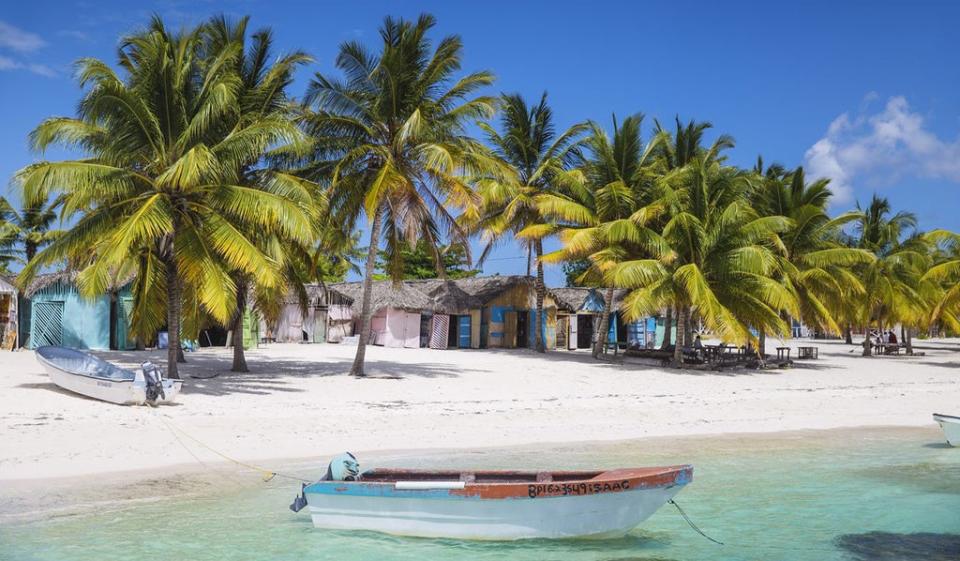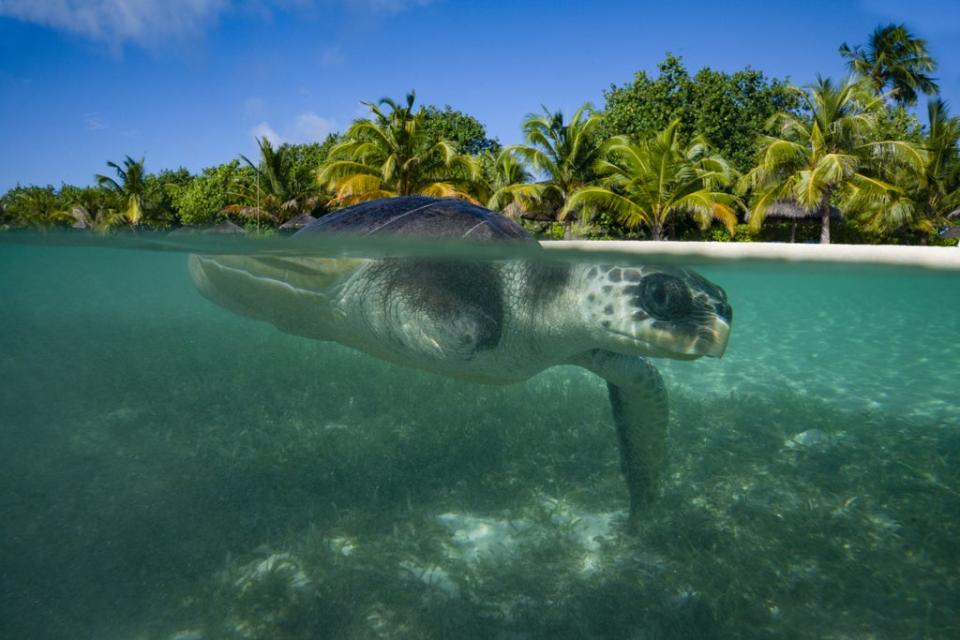Where can I go on holiday? Covid travel requirements explained

If one of your New Year’s resolutions for 2022 is to finally go on that long-postponed and well-deserved holiday, it would be wise to get yourself clued up on the travel requirements in place for your chosen destination.
Luckily, it seems like things may be looking up for the travel industry. Early January has already welcomed the relaxing of some border restrictions put in place to curb the spread of the Omicron variant. The UK’s pre-departure test requirement for returning travellers has been scrapped, and only lateral flow tests instead of PCR are now required on arrival. France is still preventing most Brits from visiting, but Germany has dropped the two-week quarantine requirement for fully vaccinated travellers from the UK.
As things stand, travel to the vast majority of countries is still possible and (relatively) pain-free. Travellers from the UK are still banned in some countries: here’s the full list of them.
However, the situation is still volatile and any plans should still leave room for possible disruption. Anyone who has travelled during the pandemic will know that Covid tests could cause delays, flights may be cancelled due to staff illness, and new variants could mean the return of the red list and quarantine hotels. Make sure you’ve swotted up on insurance and refund policies before you hit that confirm booking button.
Check the latest Department for Transport advice and Foreign Office travel advice. Make sure you know whether your destination is accepting the NHS app as proof, or if you need to show a letter.
Below is a run-through of the most popular holiday destinations and answers to your most burning questions.
EUROPE

Spain
Requirements
Spain requires travellers from the UK aged 12 or over to show proof of a full vaccination programme completed at least 14 days before arrival. Tests as an alternative to fully vaccinated status are no longer accepted for tourist visits, or for most other purposes, and this includes children aged 12 or over. All inbound travellers also need to complete the Spanish Health Control Form (FCS) and receive a QR code to show at the destination airport. More on Spain’s entry requirements here.
When you get there
A nationwide state of emergency existed in Spain between 25 October 2020 and 9 May 2021. Although that status is currently lifted, some restrictions and curfews remain in force, but these vary between regions. Beach rules may also differ depending on the part of Spain that’s being visited.
Vaccination rates in Spain are very high — around 80 per cent of the population have had two jabs.
France
Requirements
Since 20 December, British travellers have been banned from entering France except for “compelling reasons” – not including holidays, most business trips and family visits. Anyone who does enter France must quarantine for 48 hours. However, as of Friday 14 January the country has relaxed its rules.
Vaccinated travellers will no longer need a compelling reason to enter, and will not have to self-isolate when they arrive.
But a negative Covid test, taken 24 hours before leaving the UK, will still be required for all those arriving.
The rules before the tourism ban on UK travellers were: fully vaccinated travellers from the UK (12 years or older), whatever their nationality, needed to provide a negative PCR or antigen test result (in paper or digital format) that had been carried out less than 48 hours prior to departure. Prior to departure, fully vaccinated travellers entering France from the UK also needed to present a sworn statement certifying the absence of COVID-19 symptoms and of any contact with a confirmed case of COVID-19 in the 14 days prior to their crossing. They also needed to show proof of vaccination. More on travelling to France here.
When you get there
France launched health passes over the summer to access restaurants, bars and other spaces. Your vaccination status on the NHS app is valid. Face masks must be worn indoors.

Greece
Requirements
Previously you could enter Greece with just proof of full vaccination or recovery from Covid, the restrictions have now tightened. Since December 19 2020, travellers over the age of five need a negative PCR test result carried out in the 72 hours prior to departure, regardless of vaccination status, or a rapid antigen test from an authorised laboratory taken in the 24 hours before travel. Visitors must also fill in a passenger locator form at least a day before travelling. You may be asked to take a rapid antigen test on arrival and a “strongly recommended” to take further tests on days two and four.
When you get there
Face masks are standard in most indoor venues, and you may have to show proof of vaccination to get into restaurants and bars. Vaccination rates are relatively low for Europe at around 67 percent, but many tourism-reliant island areas have been deliberately prioritised.
Turkey
Requirements
Either proof of full vaccination, evidence of having recently recovered from Covid or a negative test (PCR within 72 hours or rapid antigen within 48 hours of arrival), and also a health registration form are required. There may be random PCR testing on arrival.
When you get there
Mask mandates in public are quite stringent. Turkey accepts the NHS proof of vaccination for situations when a pass is required to enter a venue. Over 60 per cent of Turks are fully vaccinated.
Italy
Requirements
All travellers to Italy, including those fully vaccinated, must show a negative test result: either a PCR taken 48 hours before entering the country or an antigen test from the 24 hours prior. Travellers must also fill in the EU passenger locator form. Unvaccinated children aged 6-17 inclusive do not need to quarantine if travelling with a fully vaccinated parent, but still have to test.
When you get there
Italy has relatively strict requirements to use face masks and show a vaccination pass to access most venues. In many settings, including flights to and from Italy, face masks must be FFP2/N95 standard, not surgical or cloth masks. Vaccination levels are high at around 75 per cent.
Croatia
Requirements
Non-EU citizens aged 12 or over need to show evidence of one of the following to be able to enter Croatia without subsequent self-isolation: a negative PCR test (within 72 hours before arrival) or negative antigen test (within 48 hours); a vaccination course completed more than 14 days prior; or a doctor’s certificate of recovery from Covid-19. You will also have to fill out an online form, and show you have paid for accommodation.
When you get there
Residents and visitors are still expected to use a mask indoors, and in open spaces where physical distancing isn’t possible. Vaccination rates in Croatia are low by European standards.

Switzerland
Requirements
Fully vaccinated travellers from Britain can enter Switzerland following a negative PCR test (in the 72 hours before travel) or lateral flow test (within 24 hours). You also need to fill in an entry form. Switzerland recognises the UK’s proof of vaccination or recovery, though not as a screenshot or photo.
When you get there
To access most areas of daily life you will have to show a certificate of vaccination or recovery, via an app or on paper. It’s compulsory to wear a face mask in other freely accessible enclosed settings, such as public transport and shops. Switzerland’s vaccination rates are quite low for Europe, at 67 per cent.
Portugal
Requirements
On entry, all travellers, regardless of vaccination status, must show proof of a negative PCR or rapid antigen test taken 72 hours or 48 hours respectively prior to departure. Any rapid antigen tests need to be carried out in a professional setting and not self-administered — travellers have recently been fined over the confusion. Children up to the age of 11 do not need to test. All travellers need to fill in a passenger locator form. There are different restrictions depending on whether you are travelling to mainland Portugal, Madeira or the Azores.
When you get there
Proof of vaccination records and/or negative test results are required to enter restaurants, bars, nightclubs and other similar indoor establishments. Face mask use is mandatory in closed spaces, including public transport. Portugal has one of the world’s highest vaccination rates at 89 per cent.
Canary Islands
Requirements
As a Spanish territory, entry requirements to the Canary Islands are the same as Spain. Travellers to the Canary Islands from mainland Spain may be required by tourist accommodation providers to show evidence of a negative test. See the Canary Island tourist board website for details.
When you get there
Masks and social distancing are required. On January 10 2022, Tenerife upgraded its alert level to “very high risk” after a surge in cases. This means tougher measures in pubs, hotels, restaurants and on public transport including buses. The rule of six now applies to social gatherings indoors and outdoors, unless they are living in the same household. Covid passes are now required for entry to establishments.
Ideally, you should download the RadarCOVID contagion alert app to notify you of the risk of exposure to Covid depending on your location. Over 75 per cent of the population are vaccinated.
CARIBBEAN

Dominican Republic
Requirements
Anyone aged five or over who has been in the UK in the 14 days before travelling to the Dominican Republic needs to be either fully vaccinated or show a negative PCR test result taken in the 72 hours before arrival. The vaccination card should be at least three weeks older than the date of travel. Visitors must also complete the country’s E-Ticket.
When you get there
The Dominican Republic lifted curfews and other emergency measures on October 11, though face-mask requirements and social distancing are still in place. Anyone over the age of 12 is also supposed to show proof of full vaccination or a negative Covid test result (valid for seven days) in order to enter enclosed spaces. If in doubt, check with your hotel what is required. The majority of the population are fully vaccinated.
Barbados
Requirements
Proof of a PCR test taken no more than three days before arrival uploaded via Travel Form or the BIMSafe app as well as carry a copy of the test are required. Fully vaccinated travellers no longer need to take a second test on arrival but a small sample of people will be randomly selected for a free rapid antigen test at the airport. Unvaccinated arrivals are required to quarantine.
When you get there
Local curfews are in place in some areas, and face masks and social distancing in public spaces are standard. About half the population is fully vaccinated.
Antigua and Barbuda
Requirements
Visitors to Antigua and Barbuda aged 18 or over need proof of full vaccination, and for anyone aged five or over, a negative PCR or approved rapid antigen test taken in the four days before their flight. There is also health screening on arrival. Visitors must not only stay in approved accommodation, but also pick from a list of certified restaurants and excursions.
When you get there
Face masks are compulsory in public places, and you must be able to show that you are fully vaccinated to go to bars or eat in at restaurants.
Grenada
Requirements
Passengers aged 13 or over need proof of full vaccination. All travellers must also apply for a Pure Safe Travel Certificate and get a PCR test 72 hours before travel. Fully vaccinated visitors no longer have to take a second text on arrival.
When you get there
A state of emergency is in place, which includes mandatory face masks in public. Most of the population is unvaccinated.

Turks and Caicos
Requirements
Visitors aged 16 or over need to be fully vaccinated and everyone aged ten or above must do a PCR, rapid antigen or other approved test in the three days before arrival. This information, along with insurance details and a health questionnaire, should be included in your TCI Assured travel authorisation (an online portal where all international travellers are required to obtain certification before travelling to Turks and Caicos).
When you get there
Restaurants and bars are open at reduced capacity, and masks are mandatory in all public places. Vaccination rates are relatively high at 70 per cent, and travel between islands is allowed.
St Lucia
Requirements
All adults must fill in a Travel Registration Form before their trip, including details of a PCR test that can be done up to five days prior to arrival. The test is also required for children (aged 5–17), and if unvaccinated they must quarantine until they get the results from a paid test on arrival. Fully vaccinated travellers do not have to go into automatic quarantine on arrival.
When you get there
Masks are mandatory in public places, and visitors are expected to stick to a list of Covid-certified hotels and restaurants. Vaccination rates in St Lucia are relatively low.
AMERICAS

United States
Requirements
Fully vaccinated travellers can come from the UK without having to quarantine on arrival. NHS proof of vaccination is accepted. Everyone aged two or over has to take a Covid-19 test no more than one day before boarding a flight to the US. Fully vaccinated travellers are also “recommended” to take a test within three to five days of arrival in the US. Unvaccinated children under 18 can enter without quarantine, but in that case the post-arrival test is compulsory.
When you get there
Covid measures in the US vary between states. Mask mandates are a huge point of political contention, but generally you are more likely to be asked to wear masks in bigger cities. There is no requirement for a vaccinations pass to get into public spaces. Vaccination rates in the US are fairly low at around 62 per cent, but vary greatly by state and area.
Canada
Requirements
Fully vaccinated Brits don’t need to quarantine, but must take an approved PCR test within 72 hours before departure and upload vaccination proof in the ArriveCAN portal. Unvaccinated children under 12 can travel with fully vaccinated adults, but those aged 12 to 17 must quarantine on arrival if unvaccinated.
When you get there
Mask mandates and similar measures vary between and within the country’s provinces, but be prepared to show proof of vaccination to access many indoor spaces. Vaccination rates are high at around 77 per cent.
Mexico
Requirements
Mexico does not require inbound travellers to show proof of vaccination or a negative Covid test. Passengers need to register with Mexico Vuela Seguro (a health declaration and contact form) before flying to the country, and to show the QR code generated on arrival. There may be temperature checks at the airport.
When you get there
Mexico’s response to the pandemic has been controversially lax despite several damaging spikes of the virus. Individual states in Mexico are imposing additional measures and restrictions; review local government websites for detailed information for where you are. Vaccination rates are low.
INDIAN OCEAN AND MIDDLE EAST

Maldives
Requirements
You must show a negative result from a PCR test taken no more than 96 hours before departure (for all travellers aged one or more), and fill in a health declaration form.
When you get there
The Maldives experienced a big spike in Covid cases in May last year, but numbers have slowed since then. Covid measures beyond arrival at the airport will be those of the relevant resort, unless you are visiting the island capital or other local islands. About two thirds of the population are fully vaccinated.
United Arab Emirates
Requirements
Covid measures are different depending on the emirate. For example, Dubai does not make vaccination status a condition of entry, while Abu Dhabi is now allowing in travellers without quarantine provided they are fully vaccinated. However, you’ll need a negative result from a PCR test taken no more than 48 hours before departure for both. A second PCR test is required on arrival in Abu Dhabi and there are also follow-up tests on days four and eight.
When you get there
Social distancing and mask requirements are standard, and vaccination rates are among the highest in the world, at around 93 per cent.
AFRICA

South Africa
Requirements
South Africa was one of the first countries to be hit by the Omicron wave, and subsequently endured a short stay on the UK’s red lit at the end of 2021. However, the Omicron peak has passed and it is now open to tourism. The main entry requirement is a negative PCR test from the 72 hours before departure for any visitor over the age of five. You must carry paper copies of a results certificate signed by a recognised practitioner. There may also be screening on arrival and departure.
When you get there
You should wear masks in public places, and ideally download South Africa’s Covid alert app. Restaurants and bars are open until 11pm. Vaccination levels are still relatively low in the country.

 Yahoo News
Yahoo News 
